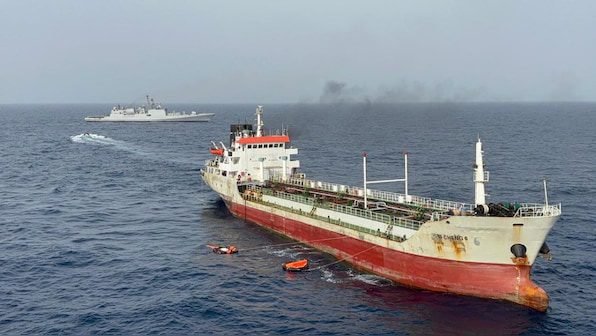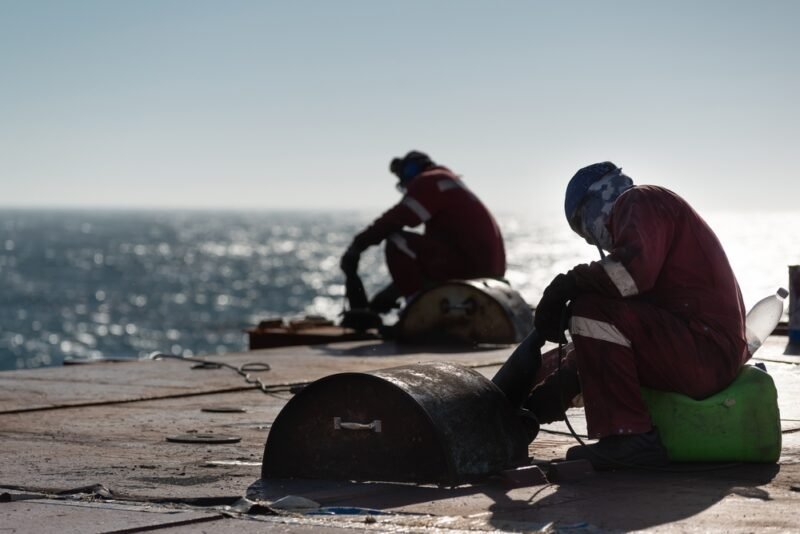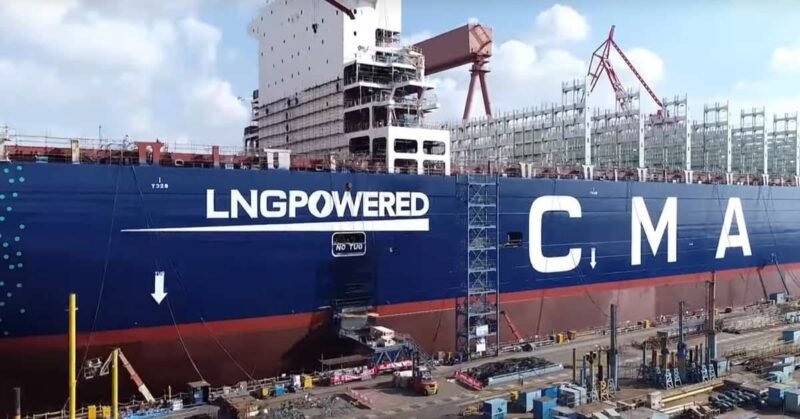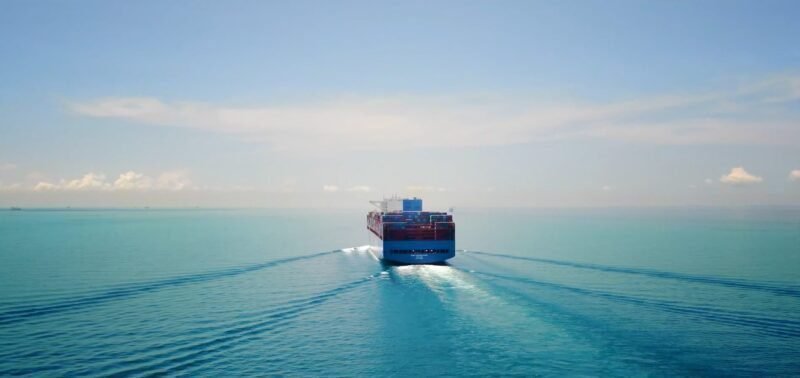Following Stories compiled in this News Digest for the week from 07 Mar 2022 to 13 Mar 2022 in descending order:
- India: JNPA eyes container terminal privatisation within a month
- War in Ukraine – Seafarers represent collateral damage
- IMO Calls for Maritime Safety Corridors to Evacuate Ships Stranded by Ukraine Conflict
- Stakeholders urge More Women to Embrace Maritime Profession
- ICS Calls for Safety Corridor to Evacuate Ships and Crews From Ukraine
- Shipping Companies Ask Crew to Abandon Ships Stuck in Ukraine
- UK securing shipbuilding future with $5 billion investment
- Shipping grapples with moving crews from war zone
- Defining the Ukraine war in maritime contracts
- IMO funds 30 places on Leadership Accelerator Programme
- World’s biggest cruise ship, Wonder of the Seas, sets sail on inaugural cruise
- 74 Indian sailors rescued from under-attack Black Sea port
- 46 Year Old Icebreaker Breaks World Record
- India: Sagar Parikrama initiative for fishermen launched from Mandvi
- Ukraine Invasion Causing Supply Chain Chaos
India: JNPA eyes container terminal privatisation within a month
13 Mar 2022
The Jawaharlal Nehru Port Authority (JNPA) is planning to complete privatisation of its only self-operated terminal – Jawahar Lal Nehru Container Terminal (JNPCT) – in a month. The authority is awaiting security clearance from the ministry of defence and the ministry of home and once these are received , it will ask the bidders to submit the requests for proposal (RFP).

The last date for submission of RFPs is March 17, which can be extended by a week if the clearance does not come by then. “Our officials are already in Delhi and we expect the clearance to happen by Monday or Tuesday,” a senior official of JNPA told FE.
The privatisation, which is part of National Monetisation Pipeline, has generated keen interest among at least 12 global port operators including, A P M Terminals Management, A P Moller Maersk, D P World, International Cargo Terminals and Infrastructure, QTerminals (Qatar), Abu Dhabi Terminals, Adani Ports and SEZ, and JSW Infrastructure.
JN Port has five terminals of which only one is operated by JNPA. Out of other four terminals, two are operated by Dubai government-owned DP World, and one each by PSA International and APM Terminals Management.
The terminal’s capacity is around 2 million TEU (twenty foot equivalent unit), but it operates at less than 50% of its real capacity due to inefficient and old equipment. “We expect the plant to easily reach to 1.7 to 2 million TEU capacity after the privatisation from its current utilisation of 0.7 million TEU,” a JNPA official said. Reference
War in Ukraine – Seafarers represent collateral damage
12 Mar 2022
Nobody, I am willing to wager, would have suggested to the crews of ships bound for Ukrainian ports last month that they might have been putting their lives on the line, or finding themselves in harm’s way.

As they headed into the Black Sea, to load export cargoes of grain, coal or fertilisers, it would have been business as usual, their Masters perhaps warned to beware of unusually high naval activity as they approached the Crimean coast. Anchored off awaiting a berth, with their deck lights burning brightly, nobody would have anticipated that any of these ships, flying flags that would have been unlikely to attract any attention, could have been the target of any hostile act, let alone a missile strike into the accommodation.
It doesn’t take a great deal of hindsight to suggest that there had been no shortage of warnings about Russia’s invasion of Ukraine, despite Moscow’s regular denials. But the charters had been inked, and for better or for worse, more than 80 merchant ships headed for what has now become a “Warlike Operations Area”, their owners hoping for the best and that it would all blow over.
Business is business, of course, but one might have thought that there had been plenty of warnings about the likelihood of hostilities. Do ship operators not read newspapers or listen to what was being broadcast? They are wiser now, with some half a dozen ships attacked, at least one sunk by a mine, and efforts now being made to extricate their crews. There have been deaths and injuries and as the situation on the Black Sea coast and Sea of Azov become ever more dangerous, it could well be that many of these effectively abandoned ships will be lost. There are historical parallels with that “ghost fleet” of ships that were abandoned when war broke out between Iran and Iraq, subsequently to be looted and wrecked.
Seafarers have always represented collateral damage in war, just as they have been during the pandemic, as the ships keep on trading regardless. The poor Third Engineer killed on the bulker Banglar Samriddhi, is just one small statistic in the tragedy of this conflict, but he was as innocent as any of the non-combatants who are dying ashore. He was just doing his job, keeping the arteries of international trade flowing, although it is not a daft question to ask what his ship was doing in such a dangerous place.
The lives of seafarers have too often been seen as secondary when a lucrative piece of business is there to be negotiated. Who remembers the aforesaid Iran-Iraq conflict, that we later called the “tanker war”, with these huge vessels used as target practice by the heroic aviators of both warring nations? There were fortunes made by owners willing to risk their undefended ships in the hazardous Gulf waters, although few of the riches would have trickled down to the crews. Some, it was said at the time, were wholly ignorant of their ship’s destination, until the Exocets started flying around.
Some 400 international seafarers died in these attacks which lasted throughout the conflict between the gulf states. But in considering the collateral damage, it is worth sparing a thought for the considerable number of Ukrainian and Russian seafarers whose lives will have been turned upside down by this horrible conflict. Reference
IMO Calls for Maritime Safety Corridors to Evacuate Ships Stranded by Ukraine Conflict
12 Mar 2022
The UN’s shipping agency will seek to create a safe maritime corridor to enable merchant ships and their crews stuck in the Black Sea and Sea of Azov to sail away without the risk of being hit, it said on Friday.

Ukrainian maritime officials have told Reuters fighting has left around 100 foreign-flagged vessels and hundreds of mariners stranded in Ukrainian ports.
Last week a seafarer was killed at the Ukrainian port of Olvia after a missile struck his Bangladesh-flagged cargo ship. Projectiles have hit four other vessels in recent days with one sunk.
The UN’s International Maritime Organization (IMO) convened a virtual meeting on Thursday and Friday to discuss the escalating situation.
A statement afterwards said the IMO’s Secretary-General Kitack Lim “indicated his commitment to take immediate action to realise the blue safe maritime corridor with the cooperation and collaboration of the relevant parties including littoral states”.
It said a maritime corridor would “allow the safe evacuation of seafarers and ships from the high-risk and affected areas in the Black Sea and the Sea of Azov to a safe place”.
The IMO meeting was held with its Council, which consists of 40 member countries who are elected for two years. Non-Council member states such as Ukraine were able to make statements.
The IMO statement said separately that the Council “deplored the attacks of the Russian Federation aimed at commercial vessels, their seizures, including search-and-sescue vessels”. Reference
Stakeholders urge More Women to Embrace Maritime Profession
12 Mar 2022
Stakeholders in the maritime sector have urged more female gender to embrace several professions in the maritime industry that is historically male dominated.

This is coming as the International Chamber of Shipping (ICS), 2021 Seafarer Workforce Report, stated that women represent only 1.2 percent of the global seafarer workforce, emphasizing it represents a positive trend in gender balance.
The report also estimated that 24,059 women serve as seafarers, which was a 45.8 percent increase compared with the 2015 report.
However, Women in Maritime Africa (WIMA), Nigeria Chapter, in line with breaking the barriers in the profession marked the IWD 2022, with the theme, “Gender Equity Today For Sustainable Tomorrow,” by giving out educational materials to selected schools and aligning female students to mentors in the sector.
Speaking at the event to raise more awareness for women in the sector, the President, WIMA, Mrs. Rollens Macfoy, said maritime has been a male dominated industry for a very long time, noting that few years ago women began to come into the profession despite the discrimination.
Making his presentation at the event, the Secretary General, Abuja Memorandum of Understanding on Port State Control, for West and Central African Region, Captain Sunday Umoren stressed that opportunities abound in the maritime “and you could work and invest in ocean freight, warehousing, ocean shipping logistics, trucking, sales, freight forwarding, air freight, railway, or as a terminal operator. Reference
ICS Calls for Safety Corridor to Evacuate Ships and Crews From Ukraine
11 Mar 2022
The International Chamber of Shipping is calling for the creation of a safe corridor to allow merchant ships and seafarers to evacuate Ukraine, citing the ongoing risk to mariners who have been trapped by the Russian invasion. Industry reports suggest that some crews have already abandoned their ships in Ukraine due to security concerns, ICS said.

“ICS fully supports the establishment of a maritime corridor to allow the safe evacuation of ships that are currently unable to leave territorial waters in the Black Sea and the Sea of Azov. They must be allowed to depart the area of conflict and avoid further humanitarian incident,” said Guy Platten, ICS secretary general, in a statement Thursday. “Multiple ships have been hit by munitions, seafarers have been killed and injured and seafarers of all nationalities are trapped on ships berthed in ports. It is of the utmost urgency that their evacuation from these areas of threat should be ensured by those states with the power to do so.”
The Russian Navy is in firm control of all waters near Ukraine and Crimea, and its forces have been blamed for the recent attacks on merchant shipping in the region.
ICS also highlighted the risks to maritime commerce arising from the sudden shutdown of travel to and from Ukraine and Russia. The two nations account for at least 15 percent of the international seafaring workforce, and they are particularly well-represented among the ranks of licensed officers. Ukrainian men of fighting age are prohibited from leaving the country, and all commercial flights to and from Ukraine have halted. Russia is almost entirely disconnected from international air travel as well.
Ukraine’s ports have also shut down due to the national emergency, and the nation has banned exports of most major food commodities in order to ensure the supply to its own population. This threatens food supplies for nations all over the world: between them, Russia and Ukraine supply about one quarter of the world’s wheat exports, ICS noted. Reference
Shipping Companies Ask Crew to Abandon Ships Stuck in Ukraine
11 Mar 2022
Some shipowners have begun to ask crew to abandon their ships stuck off the coast of Ukraine, as Russia’s invasion of its neighbor reached the end of its second week.

M.T. Maritime has evacuated 22 Filipino seafarers from its oil-products tanker MTM Rio Grande, leaving the vessel unmanned and moored at Nika-Tera port in Ukraine, the company said in an e-mailed reply to queries. The crew are currently in Romania waiting for a flight back to the Philippines, it said.
Ukraine’s ports closed on February 24, when Russian troops began their incursion. At least five out of 140 ships stuck in the country’s waters have been hit by explosions, killing a Bangladeshi seafarer.
As intense fighting and shelling continues across cities in Ukraine — a key grains exporter — ship owners are grappling with dwindling food supplies and the possibility of a protracted war, according to people with knowledge of ships in the area. That’s forcing some owners to ask their crew to abandon vessels, they said.
More than 1,000 seafarers are estimated to be onboard ships stranded in Ukraine, some with cargo still onboard. The vessels — which include tankers, bulkers, cargo ships and a container vessel — aren’t able to leave because there aren’t harbor pilots to guide them out amid danger from missiles and underwater mines. Reference
UK securing shipbuilding future with $5 billion investment
11 Mar 2022
The UK government is planning to invest £4 billion (approximately $5.3 billion) in the country’s regional shipbuilding industry as it prepares to publish refreshed National Shipbuilding Strategy (NSbS).

Prime Minister Boris Johnson announced the $5.3 billion injection into the shipbuilding sector that is expected to create tens of thousands of jobs.
The investment will also support shipyards and suppliers across the UK, delivering a pipeline of more than 150 new civil and naval vessels over the next 30 years.
It has been announced that the Ministry of Defence is getting ready to publish its refreshed NSbS today, 10 March.
The refreshed strategy will outline how the government will support UK shipyards across the nation to upskill workers, create high-quality jobs, drive technology development and ensure UK shipbuilding delivers on next-generation challenges.
The NSbS Refresh will establish a new UK Shipbuilding Skills Taskforce, led by the Department for Education, to identify and address skills gaps.
Another part of the strategy will see the Department for Transport investing £206 million (around $276 million) in the UK Shipping Office for Reducing Emissions (UK-SHORE) to match fund research and development in zero-emission vessels and infrastructure.
UK-SHORE will help to tackle barriers to investment in clean maritime technologies, including investment in port infrastructure, the government said.
Furthermore, a new Maritime Capability Campaign Office (MCCO) will be established within the Department for International Trade to coordinate export support across government and industry. Reference
Shipping grapples with moving crews from war zone
10 Mar 2022
INSURERS and employers are grappling with how to change Russian and Ukrainian crew as the crewing impacts of the military incursion worsen.

West P&I Club said repatriating Russians and Ukrainians posed a major logistical challenge for shipowners, with travel within Ukraine neither safe nor practical.
Shipowners had to seek alternatives such as repatriating seafarers to third countries or extending contracts.
Gard, a Norwegian P&I club, said this week that Russian ports were not safe for Ukrainian seafarers and there were reports of crew taken off ships for questioning about their political beliefs. One such crewman was not returned to the ship, it added.
The International Bargaining Forum, a group of employers and unions that sets pay rates for international seafarers, on Tuesday set out recommendations for repatriating crews from Ukraine.
Seafarers that finished their contracts or wished to end them early should be treated as in transit until the day they landed in the agreed third country and should be able to claim all expenses incurred to reach the Ukrainian border.
Employers should provide room and board in the agreed third country for at least two nights, the guidance continued.
Maritime charities said crews around the world were struggling with uncertainty about their families’ safety and when or if they could return home.
The International Christian Maritime Association, a group of charities, has published a list of initiatives to help Ukrainian and Russian crew. Jazon Zuidema, its general secretary, said chaplains from the Sailor’s Society and Stella Maris charities were helping humanitarian efforts in Ukraine. Reference
Defining the Ukraine war in maritime contracts
10 Mar 2022
Russia’s invasion of Ukraine may not trigger war termination clauses in certain contracts in the maritime industry.

Russia’s invasion of Ukraine and its ongoing military actions in Ukraine are acts of war as a matter of English law, according to a prominent maritime lawyer, but that does not mean that war termination clauses will necessarily trigger.
Speaking at a webinar organised by Maritime London, Global Senior Partner at Ince, Julian Clark, gave the example that war termination clauses in hull risk policies only trigger if there is a war between certain named countries, normally China, the UK, France, the US and Russia.
“So we don’t have an automatic termination position at the moment, because this is currently a war between Russia and Ukraine,” said Clark.
Clients had asked Clark whether UN intervention in Ukraine would make the situation a war under such clauses, but again the answer was no as the UN operates as a peacekeeping force.
What could trigger war clauses would be actual military intervention such as the no-fly zone Ukraine has asked its western allies to enforce in the skies over Ukraine.
Definitions of war are much broader in Bimco’s CONWAR clause, said Clark, as it talks about war, and acts in relation to war-like operations. “I think we almost certainly are now in a position where CONWAR clause would apply.”
Force Majeure is not a concept in English law, said Clark, it is a contractual arrangement and so will depend on the contract terms. The Bimco force majeure clause has a proviso that the affected party could not reasonably avoid or overcome the force majeure event, “so just because a contract becomes more expensive, more costly, more difficult to perform, doesn’t automatically mean the force majeure will apply,” said Clark. Reference
IMO funds 30 places on Leadership Accelerator Programme
09 Mar 2022
The IMO has sponsored 30 women to participate in the Maritime SheEO Leadership Acceleration Programme as part of its celebration of International Women’s Day.

The IMO has sponsored 30 women from developing countries to participate in the programme, chosen from the eight IMO Women in Maritime Associations and Women’s International Shipping & Trading Association (WISTA) International.
The eight-week programme will require 3-4 hours of weekly learning.
“The women who graduate from this program will gain insight and understanding, they will have extra tools to approach their careers and business challenges. They will hopefully have greater drive and opportunity. They will have more confidence in their ability and the future of our industry. They will be able to show leadership, and be role models and mentors in their own right,” said WISTA International president Despina Panayiotou Theodosiou at a webinar launching the programme on March 8.
IMO secretary general Kitack Lim, said: “Women leaders are vital for the future of the maritime industry. We must take steps to make the industry more welcoming and to support women on their career path. I am always committed to achieving the UN Sustainable Development Goals; this includes call five which aims to achieve gender equality and empower all women and the girls.
Participants in the programme joined the webinar and shared their current career progress, aspirations and their expectations from the course.
Marine Engineer Nadine Said from Egypt said she hoped to gain the skills to overcome difficult situations, improve productivity of female seafarers and improve the emotional intelligence of crews and their engagement.
Others in roles from law to quality management, engineering to regulation said they hoped to share their experiences from the programme to empower other women in the industry.
ICS secretary general Guy Platten said that change requires commitment from the leadership of any company, and trickles down from management. “With just 2% of the maritime workforce being women, we’re missing out on so much talent. Reference
World’s biggest cruise ship, Wonder of the Seas, sets sail on inaugural cruise
09 Mar 2022
The world’s biggest cruise ship has finally started sailing, setting off on its maiden voyage on Friday.
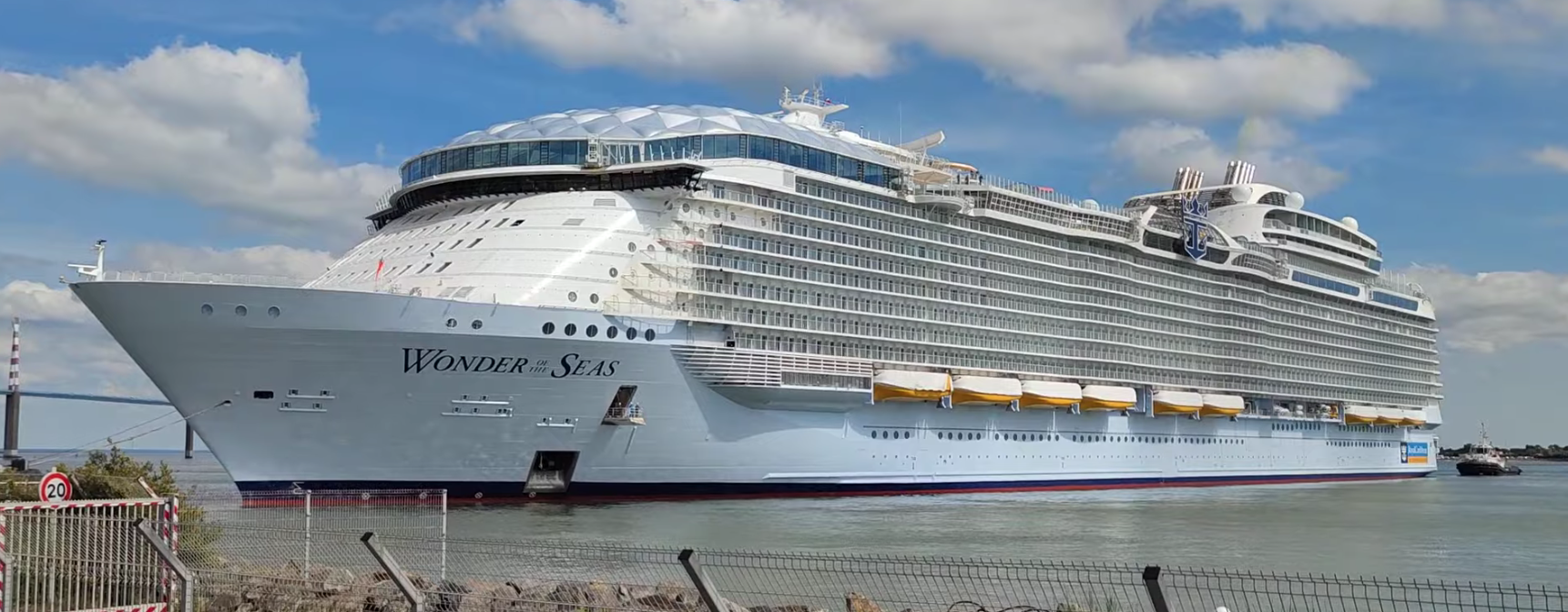
Royal Caribbean’s Wonder of the Seas will operate seven-night cruises around the Caribbean from Fort Lauderdale, Florida, through to April, before embarking on sailings to Spain and Italy for summer in the Mediterranean.
The 236,857 gross tonnes mega-liner, which accommodates up to 6988 guests and 2300 crew members, measures 362 metres long and 64 metres wide, and features everything from an ice skating rink to a network of 19 swimming pools.
Wonder of the Seas is the fifth and latest ship in Royal Caribbean’s Oasis-class fleet, considered the world’s largest passenger ships, and it joins fellow floating giants Harmony, Allure, Symphony, and Oasis of the Seas.
The vessel took three years to build, and was originally slated for a 2021 launch, but faced construction delays due to COVID-19.
Wonder of the Seas features eight themed “neighbourhoods”, in a first for the cruise line.
The ship also features 20 restaurants, bars and lounges, the tallest slide at sea, rock-climbing facilities, a surf simulator and a 10-storey-high zip line.
Wonder of the Seas officially snatches the “world’s biggest” title away from its sister ship, Symphony of the Seas, who held the record for four years. Reference
74 Indian sailors rescued from under-attack Black Sea port
08 Mar 2022
After spending 10 turbulent days at Mykolaiv port in war-torn Ukraine, 74 Indian seafarers accompanied by two Lebanese and three Syrian nationals were rescued on Monday. The seafarers were taken out of the port in two buses and travelled 200km to the Moldova border, from where the embassy and others took their safe custody. The operation succeeded after Russia announced a third attempt at creating humanitarian corridors in Ukraine.

Of the Indian seafarers, 21 had been hired by the Mumbai-based VR Maritime Services and had joined the Marshalls Island cargo vessels that were stuck at the port since February 24.
“The situation had worsened at the port with complete blackout and we could hear the shelling and the entire effect was observed in the water with the vessel shaking due to the impact,” Captain Raza Naqvi, who is from Lucknow, said in a conference call on Monday. Russian forces had resumed their attack on Mykolaiv, a vital transit point on the Black Sea coast, on Monday morning, after having been driven back from the city limits by Ukrainian troops.
“We were asked not to step out of the bus nor peep out. Once there was a tyre burst, but there was no untoward incident. There were at least 20 checks carried out by the security personnel till we reached the border, which took over eight hours. I am happy all the Indian seafarers are safe,” Naqvi said. Reference
46 Year Old Icebreaker Breaks World Record
08 Mar 2022
The US Coast Guard icebreaker Polar Star reached a position of 78 degrees, 44 minutes, 1.32 seconds south latitude in February holding a distance of approximately 500 yards from the edge of the Ross Ice Shelf, further south than the current Guinness World Record holder.

While underway, Polar Star sailed in waters previously charted as part of the ice shelf that are now navigable waters. Today, portions of the Ross Ice Shelf deviate approximately 12 nautical miles from the positions depicted on official charts.During Polar Star’s transit to and from the Bay of Whales,
The ship surveyed 396 nautical miles of the ice shelf for potential future navigational use.Crewmembers aboard the cutter are working with the staff at Guinness World Records to officially become the new record holders.
This record is a significant acheivement for a 46 year old ship that’s been plagued by recent failures most notably, in 2019, the 150-member crew of the U.S. Coast Guard Cutter Polar Star fought a fire that broke out in the ship’s incinerator room about 650 miles north of McMurdo Sound, Antarctica.
In 1997, CGC Polar Sea , Polar Star’s sister ship and previous record holder, reached 78 degrees, 29 minutes south latitude. The Polar Sea has been out of service as of 2010 due to failure of five of her six Alco main diesel engines, making the Polar Star, the United State’s only operational heavy icebreaker.
In 1908, Ernest Shackleton gave the Bay of Whales its name during the Nimrod Expedition on the basis of the numerous whales he and his crew sighted. Three years later, Roald Amundsen established a base camp in the bay, from which he set out on his successful endeavor to become the first person to reach the South Pole. Years later, U.S. Navy Rear Adm. Richard E. Byrd established Little America in the Bay of Whales during his first, second, and third Antarctic Expeditions, exploring more than 60% of the Antarctic continent. Reference
India: Sagar Parikrama initiative for fishermen launched from Mandvi
07 Mar 2022
Union Minister Parshottam Rupala on Saturday launched the Sagar Parikrama initiative from the coast of Mandvi in Gujarat’s Kutch district along the Arabian Sea.

The Union fisheries, animal husbandry and dairy minister offered tributes to freedom fighter Shyamji Krishna Varma at his memorial at Mandvi where he was born in 1857, an official said.
Sagar Parikrama was flagged off from Mandvi and reached Okha in Devbhumi Dwarka district on the first day, he said.
“During the parikrama, we will talk to fishermen about various schemes launched by the Centre for them and listen to their concerns and try to resolve them,” Rupala said.
The first leg of Sagar Parikrama will end at Mahatma Gandhi’s birthplace Porbandar on March 6.
Sagar Parikrama is being organised as part of Azadi Ka Amrit Mahotsav, with the participation of senior ministers, government officials, fishermen representatives, entrepreneurs, stakeholders, professionals and scientists from across the country.
As per an official release, the initiative will focus on sustainable balance between the utilisation of marine fisheries resources for food security and livelihoods of coastal fishing communities and protection of marine ecosystems.
Sagar Parikrama is proposed to be conducted in all coastal states and Union Territories through a pre-decided sea route, from Gujarat, Diu, Maharashtra, Goa, Karnataka, Kerala, Tamil Nadu, Andhra Pradesh, Odisha, West Bengal, Andaman and Nicobar and Lakshadweep Islands, it was stated. Reference
Ukraine Invasion Causing Supply Chain Chaos
07 Mar 2022
Russian and Ukrainian’s workers make up 14.5 per cent of seafarers.

One of the world’s biggest shipping company, Maersk, has told its customers the invasion of Ukraine is impacting global supply chains.
The Danish company has been forced to bypass various transport routes, stopping ocean and air freight to Russia and Ukraine, and suspending rail deliveries between Asia and Europe.
Fuel prices have soared, and airspace restrictions are hampering deliveries. Many carriers are also enacting war surcharges.
“Customs authorities in the European Union are now inspecting all units to/from Russia transiting their terminals/ports to identify sanctioned and restricted shipments,” Maersk told its customers.
“This is a direct consequence of the sanctions, but there are also indirect impacts as all cargo is getting delayed and our transhipment hubs are getting congested, impacting our customers’ supply chains.
Shipping Australia tells the AFR that 16 per cent of containers shipped to and from Australia “are Europe-related.” Reference






